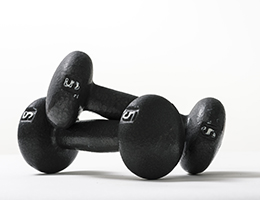
If there was a proven way to help reduce your risk of breaking a hip, wrist or other bone that didn't require a lot of time or effort on your part, would you take advantage of it?
Well, there is and you can. All you have to do is lift some weights.
Working out with weights strengthens bones. And that reduces your risk of fractures, which is very important as you get older.
But stronger bones is only one benefit of weight training. Here's what else to expect, according to the National Institutes of Health and other experts.
A trimmer figure. Increasing the ratio of muscle to fat in your body can help you trim unwanted inches, even if you don't lose pounds.
Better health. Weight training can help protect you from diabetes. And it has been linked to a decreased risk of heart disease.
Start safely
One of the most important things to remember about weightlifting? Without proper technique, you might get injured. So, if it fits within your budget, you may want to sign up for at least one beginning strength-training session with a personal trainer. A trainer also can help you get the most benefit from your muscle workouts. If you can't hire a personal trainer, you might find out if any community or senior centers offer free classes.
You'll also want to get an OK from your doctor if you haven't been active for a while, have a chronic disease or are older than 40.
When you're ready to begin:
- Aim to do two to three weekly training sessions, with at least one day off between workouts so that your muscles can recover.
- Try to work your major muscle groups, including your legs, chest, abdomen and arms.
- Start slowly, and use lighter weights at first.
Women and seniors welcome
Finally, though women often shy away from weightlifting out of fear of bulking up, they shouldn't. They naturally have more body fat and less muscle than men. As long as a woman isn't a professional body builder or athlete, she doesn't have to worry about bulking up.
As for seniors, strength training is particularly beneficial. We lose muscle strength as we get older. Regular strength training helps to counter that. By keeping you stronger longer, it makes it easier for you to do many everyday activities—like climbing stairs, carrying groceries and getting up from a chair. In other words, lifting weights may help you stay strong and able to live independently as you age.
Learn more
For general information about weight training and physical fitness in general, visit one of the following websites: American Council on Exercise and American Academy of Orthopaedic Surgeons.
Reviewed 4/26/2024
Sources
- American Council on Exercise. "Why You Should Be Lifting Heavy." https://www.acefitness.org/resources/everyone/blog/6002/why-you-should-be-lifting-heavy.
- Centers for Disease Control and Prevention. "How Much Physical Activity Do Adults Need?" https://www.cdc.gov/physicalactivity/basics/adults/index.htm.
- National Institute of Arthritis and Musculoskeletal and Skin Diseases. "Exercise for Your Bone Health." https://www.niams.nih.gov/health-topics/exercise-your-bone-health.
- National Institute of Arthritis and Musculoskeletal and Skin Diseases. "Preventing Another Broken Bone." https://www.niams.nih.gov/health-topics/preventing-another-broken-bone.
- National Institute of Diabetes and Digestive and Kidney Diseases. "Health Tips for Adults." https://www.niddk.nih.gov/health-information/weight-management/healthy-eating-physical-activity-for-life/health-tips-for-adults.
- National Institutes of Health. "Dr. Roger Fielding on Strength Training for Older Adults." https://newsinhealth.nih.gov/2020/03/dr-roger-fielding-strength-training-older-adults.
- National Institutes of Health. "Maintain Your Muscle." https://newsinhealth.nih.gov/2020/03/maintain-your-muscle.
- Office on Women's Health. "How to Be Active for Health." https://www.womenshealth.gov/getting-active/how-be-active-health.